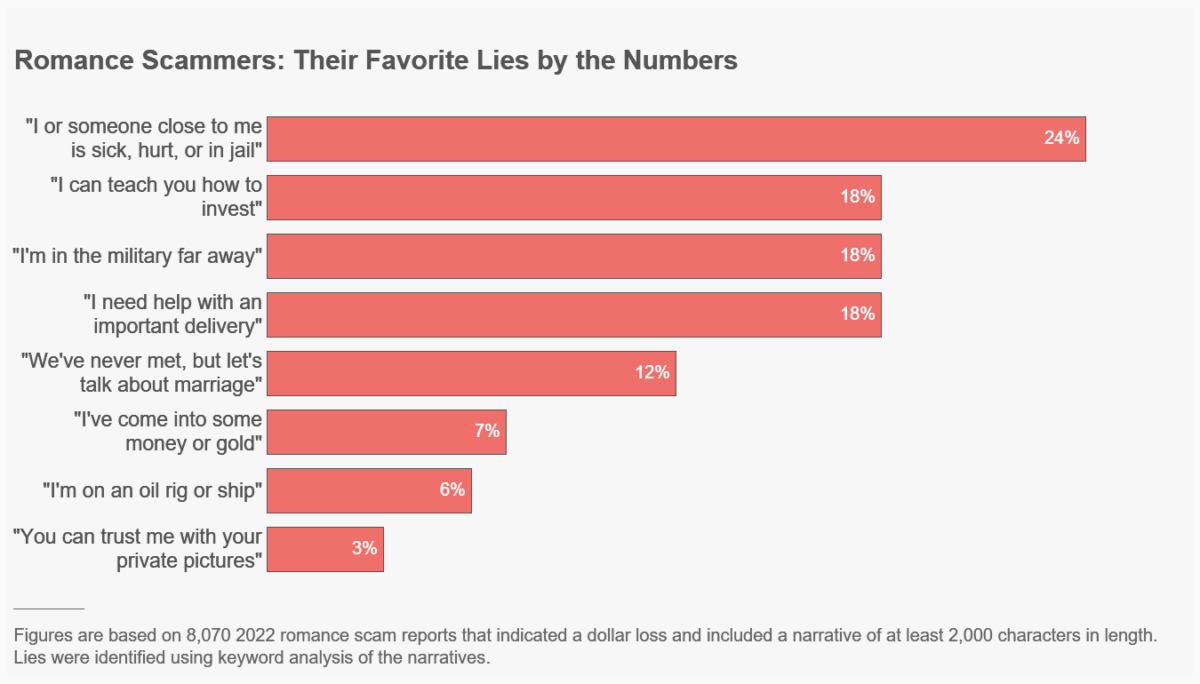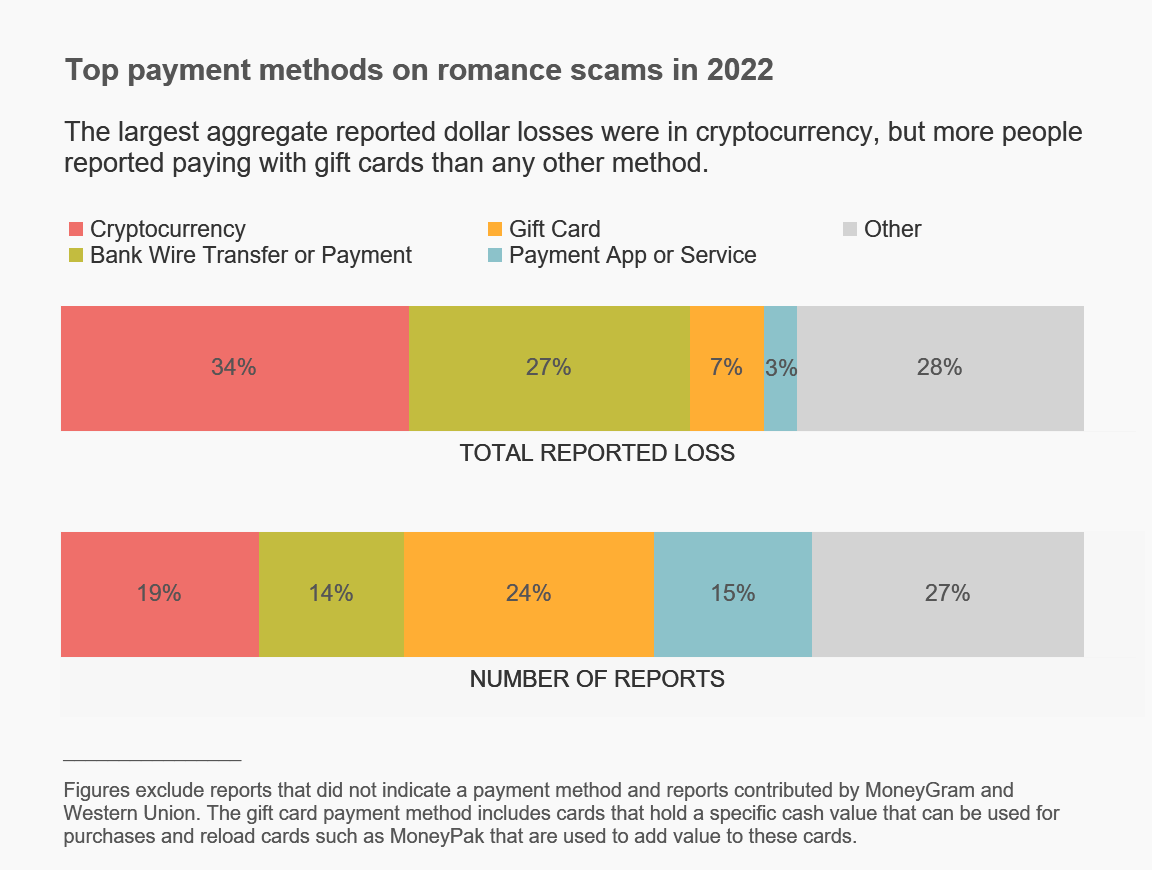New FTC Data Reveals Top Lies Told by Romance Scammers
Why Do Romance Scammers Lie Or Tell Stories To Groom And Manipulate Their Victims?
Romance scams are a form of online fraud that targets individuals. Sometimes they are looking for love or companionship, sometimes not. Romance scammers often create fake profiles on dating websites or social media, posing as potential partners, and use lies and stories to groom and manipulate their victims into ultimately sending them money or personal information. The reasons why these romance scammers lie are many, but they all boil down to one ultimate goal: to extract money from their victims.
The first reason why romance scammers lie is to create a sense of trust and emotional connection with their victims. By telling stories about their life, their background, and their interests, romance scammers aim to build a rapport with their victims and gain their trust – this is part of the grooming process. They often claim to be working overseas, in the military, or in another country, which can help explain why they are unable to meet in person. By building a relationship with their victims, romance scammers can manipulate them into being controlled and sending money or revealing personal information, such as their social security number, bank account information, or credit card details.
Another reason why romance scammers lie is to increase their victims’ sympathy and compassion – this is a form of emotional hijack which serves to better control the victim. They often pretend to be in a difficult situation, such as needing money to pay for medical bills, travel expenses, or legal fees. By tapping into their victims’ emotions and exploiting their compassion, romance scammers can convince their victims to send money, even when the requests become increasingly unreasonable. Romance scammers may also claim to be in danger or in need of urgent assistance, which can further increase their victims’ sense of urgency and make them more likely to send money.
A third reason why romance scammers lie is to establish a false sense of intimacy and exclusivity. Romance scammers often target individuals who are vulnerable and will exploit those vulnerabilities as part of their manipulation. By claiming to be the perfect match, scammers can make their victims feel special and unique, exploiting cognitive biases and vulnerabilities. They may also claim to be in love with their victims (using amygdala hijacks as a control mechanism,) which can make it difficult or impossible for the victims to end the relationship, even when others tell them they are being scammed. This false sense of intimacy can make it easier for romance scammers to manipulate their victims into sending money or providing personal information.
Finally, romance scammers lie because they believe it is an easy and effective way to make money, which based on their success proves to be very true. Many romance scammers are part of organized criminal groups or work in call centers where they are professionally trained to use very effective psychological tactics to extract money from victims. They know that individuals looking for love or companionship are often more susceptible to emotional manipulation and are less likely to suspect they are being scammed, but in truth, anyone can be scammed. By lying and telling stories, romance scammers can keep their victims engaged and extract money from them over a long period of time.
Romance scammers lie and tell stories to groom and manipulate their victims for financial gain. By creating a sense of trust, sympathy, intimacy, and exclusivity, scammers can exploit their victims’ emotions and make it easier for them to extract money. It is important for individuals to be aware of these scams and to protect themselves by never trusting anyone that they meet online and never sending money or revealing personal information to someone they have not met in person. By adopting a more risk-avoidance set of behaviors and being cautious and skeptical of online relationships, individuals can protect themselves from falling victim to these types of romance or relationship scams.
FTC Data Spotlight Also Shows Large Increase In ‘sextortion’ As Tool For Romance Scammers
NOTE: SCARS is an FTC sentinel reporting partner through the SCARS|CDN Cybercrime Data-Reporting Network and www.Anyscam.com
FTC Romance Scammers Data
New data released by the United States Federal Trade Commission sheds new light on the lies (stories) that romance scammers use to take advantage of people—lies that reports to the FTC show cost nearly 70,000 consumers $1.3 billion in 2022. [REMEMBER: the U.S. government data is based only on what is reported to them. Since about 1% is reported, multiply their numbers by 100]
Romance scammers tell all sorts of lies to steal your heart and money, and reports to the FTC show those lies are working. Last year’s romance scam numbers looked a lot like 2021 all over again, and it’s not a pretty picture. In 2022, nearly 70,000 people reported a romance scam, and reported losses hit a staggering $1.3 billion. The median reported loss: $4,400 – this has dropped significantly since the 2019 number of $9,600.
These scammers pay close attention to the information you share and don’t miss a beat becoming your perfect match. You like a thing, so that’s their thing, too. You’re looking to settle down. They’re ready too. But there is one exception – you want to meet in real life, and they can’t. Reports show their excuse is often baked right into their fake identity. Claiming to be on a faraway military base is the most popular excuse, but “offshore oil rig worker” is another common (and fake) occupation. In short, there’s no end to the lies romance scammers will tell to get your money.
Using data from the FTC’s Consumer Sentinel Network, the new data spotlight breaks down the most common lies that victims have reported being told when they were contacted by romance scammers while being groomed and manipulated in 2022.
Topping the list was scammers telling consumers that they needed money because a friend or relative was sick, hurt, or in jail – a lie consumers reported hearing in nearly a quarter of reports. The next most commonly reported lie was that the scammer had great investment advice to share with their newfound romantic interest, followed closely by the lie that the scammer was in the military, or that they needed help making some sort of important delivery.
More About Romance Scammers
Reports show romance scammers often use dating apps to target people looking for love. But reports of romance scams that start with unexpected private messages on social media platforms are even more common. In fact, 40% of people who said they lost money to a romance scam last year said the contact started on social media; 19% said it started on a website or app. Many people reported that the scammer then quickly moved the sweet talk to WhatsApp, Google Chat, or Telegram.
You may have heard about romance scammers who tell you they’re sick, hurt, or in jail – or give you another fake reason to send them money. But did you know that many romance scammers operate by offering to do you a favor? They may claim to be a successful cryptocurrency investor who’ll teach you how it’s done. But any money you “invest” goes straight into their wallet. In another twist, they might say they’ve shipped you a valuable package (not true), which requires you to send money for “customs” or some other made-up fee. It’s all a lie. You send the money, and the package never turns up.
The spotlight notes these reports have increased more than eightfold in the past three years, with consumers ages 18-29 six times more likely than older consumers to report this form of romance scams. This is largely, because of relationship/investment scams that involve cryptocurrency – Pig Butchering scams.
According to the spotlight, consumers most often report being contacted by romance scammers via social media, though they often push to move their chats or communications to other messaging apps. Consumers also reported losing more money by sending cryptocurrency than any other method.
—
How They Take Your Money
The way romance scammers take your money is another important piece of the story. People reported sending more money to romance scammers using cryptocurrency and bank wires than any other method: together, they accounted for more than 60% of reported losses to romance scams in 2022. While not the costliest payment method, gift cards were the most frequently reported – 24% of people who reported losing money to a romance scam in 2022 said it was taken using gift cards.
Sextortion
Reports also show that scammers who convince you to share explicit photos will then threaten to share them with your social media contacts. It’s called sextortion, and these reports have increased more than eightfold since 2019. People aged 18-29 were over six times as likely to report sextortion than people 30 and over. About 58% of 2022 sextortion reports identified social media as the contact method, with Instagram and Snapchat topping the list.
The data spotlight also highlights a growing tactic used by romance scammers: sextortion, when a romance scammer convinces a consumer to share explicit photos and then threatens to share those photos with the consumer’s social media contacts.
Spotting Romance Scammers
So how can you spot a romance scammer in the act?
- Nobody legit will ever ask you to help—or insist that you invest— by sending cryptocurrency, giving the numbers on a gift card, or wiring money. Anyone who does is a scammer.
- If someone tells you to send money to receive a package, you can bet it’s a scam.
- Talk to friends or family about a new love interest and pay attention if they’re concerned.
- Try a reverse image search of profile pictures. If the details don’t match up, it’s a scam.
- Also beware of scam investigators or money recovery scammers – you do not need to pay anyone for these services – your local police will do them of free.
How To Report/Where To Report?
If you lost money: the way to report this is FIRST with your LOCAL POLICE – they are your first responders, and will be the ones to recover your money if at all possible!
Then report to:
- U.S. Secret Service – the Secret Service wants to talk to you
- Find the nearest U.S. Secret Service Field Office to you
https://www.secretservice.gov/contact/field-offices - Crypto Scams can also be reported by email to: CryptoFraud@SecretService.gov
- Victims who require further assistance may call 1-888-813-USSS
- Deaf and hard of hearing 202-406-5370
- Find the nearest U.S. Secret Service Field Office to you
- U.S. Federal Trade Commission at https://reportfraud.ftc.gov/#/?orgcode=SCARS – the FTC will send a copy of your report to the FBI, so you don’t have to bother.
- SCARS on www.Anyscam.com – for worldwide distribution.
♦ SCARS no longer recommends reporting to the FBI
♦ NEVER REPORT YOUR CRIME TO ANY PRIVATE FOR-PROFIT COMPANY – THEY ARE ONLY INTERESTED IN EXPLOITING YOU
You can find more places to report here: https://romancescamsnow.com/reporting-entity-directory/
SCARS Romance Scam Life Cycle Webinar
-/ 30 /-
What do you think about this?
Please share your thoughts in a comment below!
Do You Need Support?
Get It Now!
SCARS provides the leading Support & Recovery program for relationship scam victims – completely FREE!
Our managed peer support groups allow victims to talk to other survivors and recover in the most experienced environment possible, for as long as they need. Recovery takes as long as it takes – we put no limits on our support!
SCARS is the most trusted support & education provider in the world. Our team is certified in trauma-informed care, grief counseling, and so much more!
To apply to join our groups visit support.AgainstScams.org
We also offer separate support groups for family & friends too.
Become a
SCARS STAR™ Member
SCARS offers memberships in our STAR program, which includes many benefits for a very low annual membership fee!
SCARS STAR Membership benefits include:
- FREE Counseling or Therapy Benefit from our partner BetterHelp.com
- Exclusive members-only content & publications
- Discounts on SCARS Self-Help Books Save
- And more!
To learn more about the SCARS STAR Membership visit membership.AgainstScams.org
To become a SCARS STAR Member right now visit join.AgainstScams.org
To Learn More Also Look At Our Article Catalogs
Scam & Crime Types
More SCARS
- ScamsNOW Magazine – ScamsNOW.com
- ContraEstafas.org
- ScammerPhotos.com
- AnyScam.com – reporting
- AgainstScams.org – SCARS Corporate Website
- SCARS YouTube Video Channel













![An Example of How Scammers Use Emergency Scams - 2014 [UPDATED 2024] - on SCARS RomanceScamsNOW.com](https://romancescamsnow.com/wp-content/uploads/2014/06/emergency-scams.png)

Please Leave A Comment - Tell Us What You Think About This!